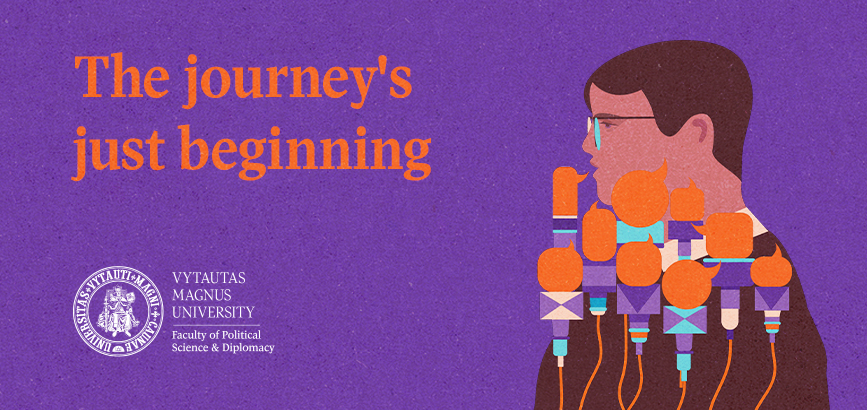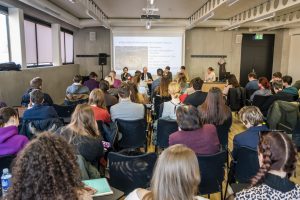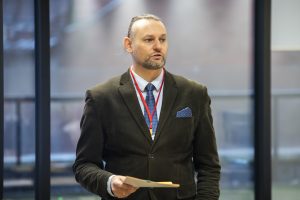On-line Discussion on EU Public Diplomacy and Media Narratives
The Faculty of Political Science & Diplomacy organized the on-line discussion on EU Public diplomacy and Media Narratives. During the workshop the main results of Jean Monnet Project Youth Opinion and Opportunities for EU Public Diplomacy: Youth Narratives and Perceptions of the EU and EU-Ukraine Relations in Ukraine and the three Baltic States (E-YOUTH) were presented.
Workshop programme:
Ukraine through a Baltic Lens and Images of the Baltic States in the Eyes of the Ukrainian Youth and Media
The key presenter and project leader Prof. Natalia Chaban is a Jean Monnet Chair and Director of Public Diplomacy and Political Communication Forum, Department of Media and Communication, University of Canterbury, New Zealand.
Ukrainian Youth on Ukraine-Baltic Relations. Results of the Survey.
Dr. Iana Sabatovych, Public Diplomacy and Political Communication Forum, University of Canterbury, New Zealand
Lithuanian Youth Perceptions of Media Narratives on Ukraine and EU: the Evidence from 2017 and 2020.
Dr. Gintaras Šumskas, assistant professor at Vytautas Magnus University and the research director at Vilnius Institute of Policy Analysis.
On-line Discussion on EU Public Diplomacy and Media Narratives
The Faculty of Political Science & Diplomacy invites to join the on-line discussion on EU Public diplomacy and Media Narratives. During the workshop the main results of Jean Monnet Project Youth Opinion and Opportunities for EU Public Diplomacy: Youth Narratives and Perceptions of the EU and EU-Ukraine Relations in Ukraine and the three Baltic States (E-YOUTH) will be presented.
Workshop programme:
Ukraine through a Baltic Lens and Images of the Baltic States in the Eyes of the Ukrainian Youth and Media
The key presenter and project leader Prof. Natalia Chaban is a Jean Monnet Chair and Director of Public Diplomacy and Political Communication Forum, Department of Media and Communication, University of Canterbury, New Zealand.
Ukrainian Youth on Ukraine-Baltic Relations. Results of the Survey.
Dr Iana Sabatovych, Public Diplomacy and Political Communication Forum, University of Canterbury, New Zealand
Lithuanian Youth Perceptions of Media Narratives on Ukraine and EU: the Evidence from 2017 and 2020.
Gintaras Šumskas, assistant professor at Vytautas Magnus University and the research director at Vilnius Institute of Policy Analysis.
Discussion and Q & A session.
Event date: August 27th, 12:00
Please follow this link to enter the meeting.
If the link above does not work, please copy – paste the link bellow to your preferred internet browser.
Graduation Ceremony
22 06 2021, 2:30 p.m. (Great Hall, S. Daukanto str. 28) will be a graduation ceremony of Vytautas Magnus University, Faculty of Political Science and Diplomacy.
Diplomas will be awarded to graduates of the following programs:
Future Media and Journalism
Diplomacy
Diplomacy and International Relations
Integrated Communication
World Politics and Economics
Politicas Studies
Sociol – political Critique Studies
Contemporary European politics
International Policy and Development Studies
Administration of State institutions
Public Administration
Public Communication
Vytautas Magnus University appreciates how important the graduation ceremony is for every student, especially the bachelor’s degree graduates, who will receive a higher education diploma for the first time in their lives. In light of this, the university seeks to ensure that the memories of the celebration are vivid and preserved for many years to come.
Regrettably, the celebration will not be open to everyone, the way it was before. Taking into account the quarantine situation declared in the entire country due to the threat of the spread of COVID-19, to ensure the safety of the university’s community and their relatives, this year VMU graduate ceremonies will be a bit different than usual.
Vytautas Magnus University’s diplomas will be awarded to the graduates in VMU spaces. However, relatives and friends will be able to congratulate and take pictures with the new alumni outside. They will be able to watch the diploma award ceremony itself live at vdu.lt/diplomai on their smartphones and other devices.
Due to the strict requirements of the appropriate disinfection and preparation of academic dress (gowns) for their continued safe use, we will not be able to provide them for all VMU graduates. Therefore, it has been decided that gowns will be worn only by the university’s bachelor’s degree graduates, who will celebrate their first-ever academic graduation ceremony.
We encourage all graduates to bring personal protective equipment. All participants of the graduation ceremony are required to wear medical masks or respirators.
We hope to see you soon at this milestone event, where everyone is filled with joy and a sense of pride after successfully completing an important stage of their lives.
Nevertheless, the graduates who are unable to attend the graduation ceremony will be able to receive their diploma at their faculty (in five workdays after the ceremony), or at the Department of Studies (after this time period ends).
Prof. R. van Voren public lecture “Society and the Individual: on Collaboration, Resistance and Compliance”
 Prof. Robert van Voren in his public lecture “Society and the Individual: on Collaboration, Resistance and Compliance” uses his own “career” as human rights activist to explore the boundaries between the positioning of the overwhelming majority of any population – compliance – and the two “extremes”: resistance, or collaboration. In the course of time much of his writings have focused on the crossroads between mental health and human rights and the reasons why individuals on one hand become active participants in mass murder and genocide, and on the other find the courage to say “no” and bear the consequences. He explains how in the course of time his rather black-and-white views mellowed and gradually developed into one of “shades of grey”, realizing that judging afterwards and from outside is very easy but taking decisions on the spot and in times of turmoil is often a very complicated and painful affair. As the German politician and former East-German dissident once said: “There are real perpetrators and real victims, guilty ones and innocent ones and then in between the many others, we – who lived there, busy getting by, more or less decent, more or less clever, more or less cowardly or brave.”
Prof. Robert van Voren in his public lecture “Society and the Individual: on Collaboration, Resistance and Compliance” uses his own “career” as human rights activist to explore the boundaries between the positioning of the overwhelming majority of any population – compliance – and the two “extremes”: resistance, or collaboration. In the course of time much of his writings have focused on the crossroads between mental health and human rights and the reasons why individuals on one hand become active participants in mass murder and genocide, and on the other find the courage to say “no” and bear the consequences. He explains how in the course of time his rather black-and-white views mellowed and gradually developed into one of “shades of grey”, realizing that judging afterwards and from outside is very easy but taking decisions on the spot and in times of turmoil is often a very complicated and painful affair. As the German politician and former East-German dissident once said: “There are real perpetrators and real victims, guilty ones and innocent ones and then in between the many others, we – who lived there, busy getting by, more or less decent, more or less clever, more or less cowardly or brave.”
The public lecture will be live streamed because of COVID-19 restrictions on 21st of May, 2021 at 1:00 p.m.
You are welcome to attend the public lecture via YouTube
AABS 2021-2022 Grants and Fellowships
The Association for the Advancement of Baltic Studies (AABS) offers various grants and scholarships to increase the quality and dissemination of research and other information about Baltic studies.
We are now accepting proposals for our Birnitis, Grundmanis, Saltups, Emerging Scholars, and Dissertation grants and fellowships for the academic year 2021-2022.
Dissertation Grants for Graduate Students
AABS invites applications for grants of up to $4,000 to support doctoral dissertation research and write-up in any field of Baltic Studies. Funds may be used for travel to research sites, equipment, duplication or other needs as specified.
More info: https://aabs-balticstudies.org/grants-fellowships/dissertation/
Research Grants for Emerging Scholars
AABS invites applications for research grants of up to $6,000 in any field of Baltic Studies.
More info: https://aabs-balticstudies.org/grants-fellowships/emerging/
The Aina Birnitis Dissertation-Completion Fellowship in the Humanities for Latvia
The Aina Birnitis Scholarship supports a year of research and writing to help advanced graduate students in the humanities in the last year of Ph.D. dissertation writing. The fellowship provides a $21,000 stipend for one year plus $1,000 for university fees.
More info: https://aabs-balticstudies.org/grants-fellowships/birnitis/
Mudīte I. Zīlīte Saltups Fellowships
AABS invites applications for Short-Term Study or Research Grants for up to eight weeks of study in the United States with a maximum stipend of $10,000.
More info: https://aabs-balticstudies.org/grants-fellowships/saltups/
Jānis Grundmanis Postgraduate Fellowship
The Jānis Grundmanis Postgraduate Fellowship, established in the memory of Dr. Jānis Grundmanis, is an annual fellowship of $20,000 for graduate study in the United States.
More info: https://aabs-balticstudies.org/grants-fellowships/grundmanis/
The application deadline for grants and fellowships for the academic year 2021-2022 is February 1, 2021.
Award notifications will be made in April 2021.
The project The Emergence of New States in Eastern Europe in 1918
The project The Emergence of New States in Eastern Europe in 1918 Lessons for Entire Europe (TENSE), implemented by WiseEuropa, was completed in March 2020. It was a project that focused on the process of building nations after 1918 in Eastern Europe. The project aimed to increase knowledge in a region characterized by common features of processes presenting nations as a system of connected vessels and show the differences between them, placing them in a broader European context. In order to achieve allproject goals, there were established a consortium gathering various actors from Eastern Europe varying from local administration through think-tanks and academia up to journals which published a report and series of articles on the post-First World War nation-building processes in the Eastern Europe and their relevance for current Europe. They were based on a regional approach to the region, trying to extract the main common elements of this period. The main message of these publications was transformed into a public exhibition that was presented in all participant countries and in Brussels in order to reach out to a broader audience in Europe. As part of the project, there were organized open debates with the participation of local experts, scientists, and journalists to stimulate citizens to acquire knowledge in the area covered by the project. There were also published series of publications in widely recognized and well-known Europe-oriented magazines that are available throughout the European Union. The TENSE project also brought together European experts focused on nation-building processes to enrich their research on regional impact in their home countries through the European context of these events and many common points. He also contributed to the creation of a scientific network that influenced public debate in the European Union and later after the project. As part of the project, an exhibition presenting the political situation in Eastern European partner countries was also prepared, which wasshown during debates organized as part of the project. As part of the project, meetings were held debates and presentation of the exhibition on the subject of the project in the following countries:
1) 20th March 2019, in Warsaw, Poland,
2) 25th April 2019, in Kaunas, Lithuania,
3) 10th June 2019, in Riga, Latvia,
4) 16th September 2019, in Tallinn, Estonia,
5) 3rd October 2019, in Pori, Finland,
6) 4th February 2020, in Brussels, Belgium.
International Diplomats’ and Experts’ Discussion on Europe’s Future
 VMU Department of Regional studies of the Faculty of Political Science and diplomacy cordially invites to the round table international discussion “European Union after 2019 Parliamentary elections and the approval of the Commission: The New perspective”.
VMU Department of Regional studies of the Faculty of Political Science and diplomacy cordially invites to the round table international discussion “European Union after 2019 Parliamentary elections and the approval of the Commission: The New perspective”.
The diplomats and experts will discuss the new European perspective and directions in the context of Brexit and formation of the new Commission cabinet. Will Europe succeed in EU renewal? How will it look like the new European perspective without the United Kingdom? Does the increased number of euro-skeptical political forces in the European Parliament make an impact on EU decision making? What are the expectations of citizens in different EU member states and candidate countries?
The event took place on the 24th of February, 2020, at V. Putvinskis st. 23 – 311.
Participants of the round table discussion:
H.E. Mrs. Claire Lignières-Counathe, Extraordinary and Plenipotentiary Ambassador of France Republic to Lithuania;
Proffesor emeritus Mr. Alpo Rusi; served as Finland‘s ambassador to Switzerland and foreign affairs advisor to Finnish president M.Ahtisaari, also senior advisor of the UN General secretary and coordinator for Sarajevo summit (1999) and deputy coordinator of the Stability pact for Western Balkans (1999-2000);
Dr. Mladen S. Mrdalj, professor of international relations and comparative politics of Bosnia and Herzegovina International Burch university and Boston‘s „Northeastern University“;
Dr. Robertas Pogorelis, Press Officer of the European Parliament Liaison Office in Lithuania;
The moderator of the event dr. Sima Rakutienė is Associate professor of European studies and political science, Head of the Department of Regional studies of Vytautas Magnus University in Lithuania.
The event is organized as part of the project „Representation of Lithuania‘s interests and citizens in the European Parliament“ results funded by the Research Council of Lithuania (project No. S-LIP-19-65).
Contacts for more information- Assoc. Prof. Dr. Sima Rakutienė; el. paštas: sima.rakutiene@vdu.lt
Call for Abstracts: 6th Annual Conference on Contemporary Political Processes
6th Annual Conference on Contemporary Political Processes
CONTEMPORARY POLITICAL PROCESSES: CHALLENGES AND OPPORTUNITIES
24 April, 2020, Kaunas, Lithuania
Scholars and students working in various subfields of political science are invited to submit proposals for the Sixth Annual Conference on Contemporary Political Processes: challenges and opportunities.
The conference is organized by the Faculty of Political Science and Diplomacy and hosted by Vytautas Magnus University.
The conference aims to enhance discussions in various subfields within the discipline of political science and provide scholars with an opportunity to share the results of their research.
The organizers welcome individual abstracts submissions as well as proposals for full panels and roundtables.
Scholars and students can submit their proposals within the following thematic fields:
– Lithuania in the Global World
– International and National Security
– Regional Studies;
– Challenges to Governance and Public Administration;
– News outlets, Social Media and Information Warfare;
– Comparative Politics;
– Other thematic fields are welcome.
Conference languages: Lithuanian and English
Please use this link to submit your abstract by 1 April 2020. Abstracts should not exceed 200 words.
Notifications of acceptance will be sent by email by 12 April. The conference programme will be announced on 13 April 2020.
There is no conference fee. Travel and living expenses are not covered by the organizers.
For further inquiry: gerda.jakstaite@vdu.lt
International project members’ meeting
On January 21-22, lecturers and researchers from the universities of Ukraine, Sweden, Poland and Estonia visited VMU – guests came here as participants of the Erasmus + project “Rethinking Regional Studies: The Baltic-Black Sea Connection”. VMU is represented in the project by the Faculty of Political Science and Diplomacy and its aim is to Europeanize the Master’s degree programs in political science at the Universities of Odessa, Lviv, Mariupol and Kiev (Ukraine).
Project members’ meetings and trainings take place in the partner universities: Vytautas Magnus University, University of Tartu (Estonia), Poznan A. Mickiewicz University (Poland), Lund University (Sweden), Mariupol State University (Ukraine), I. Frank National University in Lviv (Ukraine), Odessa National II Mechikov University (Ukraine), T. Shevchenko National University Kiev (Ukraine).
On January 21 – 22, a meeting of all project partners took place at the VU Faculty of Political Science and Diplomacy to review the project and prepare for the end of the project.
Reception of foreign partners at Vytautas Magnus University was coordinated by VMU Department of Regional Studies prof. Mindaugas Jurkynas and Vice-Dean of the Faculty of Political Science and Diplomacy Aistė Žemaitytė.
Debate: POLISH-AMERICAN BILATERAL RELATIONS AND THEIR INFLUENCE ON REGIONAL SECURITY
Ministry of Foreign Afffairs of the Republic of Lithuania
Vytautas Magnus University
Polish Institute in Vilnius
Martynas Mažvydas National Library of Lithuania
Place: Martynas Mažvydas National Library of Lithuania, Conference Hall (5 flour, Gedimino ave. 51, Vilnius)
Time: 12th November, 2019, 6 pm.
Language: English.
Panelists:
GIEDRIUS ČESNAKAS, ASSOC. PROF. (General Jonas Žemaitis Military Academy of Lithuania);
IEVA KARPAVIČIŪTĖ, PhD (Vytautas Magnus University);
ŽYGIMANTAS PAVILIONIS, PhD (member of the Seimas of the Republic of Lithuania; former Ambassador of the Respublic of Lithuania to the U.S., 2010 – 2015)
TOMASZ SMURA, PhD, Director of Research Office, Foreign Policy Programme Director, The Casimir Pulaski Fundation in Warsaw;
Moderator:
ANDŽEJ PUKŠTO, Assoc. Prof. (Vytautas Magnus University)
Main questions of debate: How strong are Polish-American relations currently? What is their influence on security architecture of Eastern and Central-Eastern Europe including the Baltic states? Has the NATO‘s Eastern flank become stronger thanks to it? What is the current state of Eurotalantic relations today and what are the predictions for future? Can we imagine Poland as a main bridge between the US and the EU? Polish – American initiativies and European energy security.




































